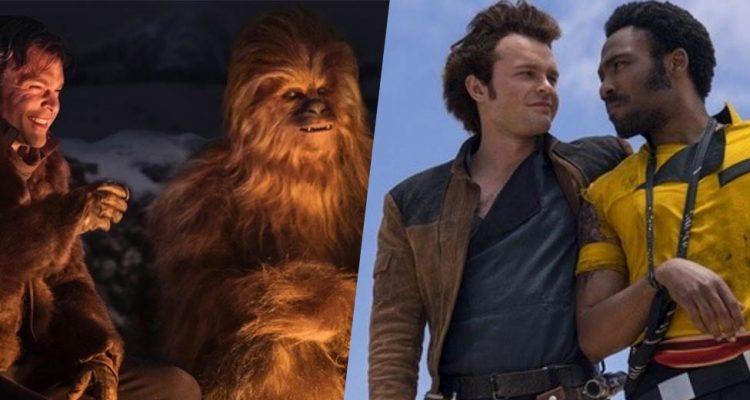Is “Star Wars” in trouble? I’m very much on the same page as Forbes box office reporter Scott Mendelson of late who recently said, “‘Star Wars’ fatigue is not real. Audiences just didn’t think ‘Solo‘ was worth racing out to see in theaters over Memorial Day Weekend.” The evidence suggests as much. Every “Star Wars” movie under the Disney era, even ‘Rogue One’ has grossed over a $1 billion worldwide, so it’s a bit of a ridiculous stretch to suggest one disappointing movie (which will end up as a financial flop mind you) has killed a mega-franchise like this one.
Regardless, because “Star Wars” has been so unimpeachable thus far (at least in terms of financial success), there is a lot of worry, concern, and hyperbole in fandom, the media and regular ol’ bystanders with an opinion on “Star Wars.” The New Yorker just ran a piece featuring the withering headline, “The Growing Emptiness Of the ‘Star Wars’ Universe” and further embarrassing is a THR piece that lists out the dozens of questions you didn’t need answered that ‘Solo’ felt compelled to reveal.
LISTEN: ‘Solo: A Star Wars Story’: Spoilers, Easter Eggs, Box Office, And More! [Podcast]
Either way, it has not been a good week for “Star Wars” and it’s about to get even worse this week when the movie drops about 65% from its previous weekend at the box office (final global predictions are dire).
But perhaps it’s all down to the prequel and the inherent problems posed by these kinds of “this is how it all happened” stories. Like the detested George Lucas-era “Star Wars” I-III trilogy, prequels often just fill in gaps, demystify legends, deflate myth and render beloved heroes as lesser shells of themselves. Often told as bridge films—how A got to B and then to C— prequels are arguably fundamentally unimaginative.
Take ‘Solo,’ for example, a movie that barely justifies its existence. The Ron Howard-directed film, often pedestrian in its approach to history and lore, doesn’t deepen or enrich our understanding of the character, it illuminates almost nothing about who Han Solo is and again, just answers every possible question about this smuggler—how he won the Millennium Falcon, how he got his name, how he met Chewbacca, etc. The New York Times likened the movie to a Wikipedia entry: harsh, but not wrong.
READ MORE: ‘Solo: A Star Wars’ Screenwriters Discuss Why They Included The Shocking [Spoiler] Cameo
Prequels also face the inescapability of the knowledge and history you already know. More often than not, audiences already know the outcome so it’s hard to create stakes. I am often reminded of the cogent words of Damon Lindelof who spoke about the inherent problems with prequels when tasked to rewrite “Prometheus” and make it less of a direct prequel to Ridley Scott‘s “Alien.”
“There’s a problem with prequels; there’s something I don’t like about prequels, which is there’s an inevitability, that you’re just connecting dots,” he said at the time in 2015.
Perhaps not surprisingly, the screenwriter/producer also went off on the Lucasfilm movies.
“So this idea of the Star Wars prequels, for example, is you’re going to make three movies where you basically just tell me what I already know,” he elaborated. “At least embed a new idea in there that I didn’t already know, or introduce a different thematic [element].”
And obviously ‘Solo’ is bereft of any new ideas and is just a straight, “this is how it all happened” origin story that explains all of Han Solo’s mythos. But Lindelof nails the intrinsic problems with prequels in this comment he made to THR in 2012: when you pull the curtain back on history and puncture the power of mystery, the not-very-gratifying experience can feel like uninspired transcription.
“Connecting dots is not that rewarding of an experience,” he said. “What’s rewarding is putting a puzzle together and popping that final piece in, and suddenly you understand — this actually does connect to the world I know but in unexpected ways. So it was really about embracing something that felt a little bit more original and unexpected. Not to say that there would not be tips of the cap or strains of the familiar tropes of Alien, but they’d be more like afterthoughts as opposed to the bricks upon which the foundation was constructed.”
Regardless of whether you feel as though Lindelof succeeded or not is beside the point: the ideas are sound.
Prequels are common. Good prequels are rare. And there’s a lot of bad ones, and often the ones that kill the mystique of a cherished brand: the aforementioned “Star Wars” prequels I-III, the Hannibal Lecter films, “X-Men Origins: Wolverine,” the ‘Exorcist‘ prequels, the ‘Hobbit‘ trilogy, “300: Rise Of An Empire,” “Dumb and Dumber: When Harry Met Lloyd,” “Carlito’s Way: Rise To Power,” the ‘Conjuring‘ prequel “Annabelle,” 2011’s “The Thing,” “Oz The Great And Powerful” and many, many more (ironically, the “Hannibal” TV series is an excellent prequel and among the very best).
Memorable prequels are uncommon. Even the ones generally regarded as the best of the bunch—I’m thinking of “X-Men: First Class,” “Indiana Jones And The Temple Of Doom“— are good only in relative relation to how awful most of the conventional ones are. Good prequels like the new ‘Planet of The Apes’ franchise, “The Good, The Bad & The Ugly,” “Batman Begins” (which is arguably just a reboot that starts early since it’s not based on a pre-existing film narrative we know), often aren’t concerned with connecting dots and instead preoccupied with enriching our understanding of the world and milieu that this character was born into and informed from (let’s not consider “The Godfather Part II” a full-blown prequel though it certainly has elements of it and is obviously unassailable).

